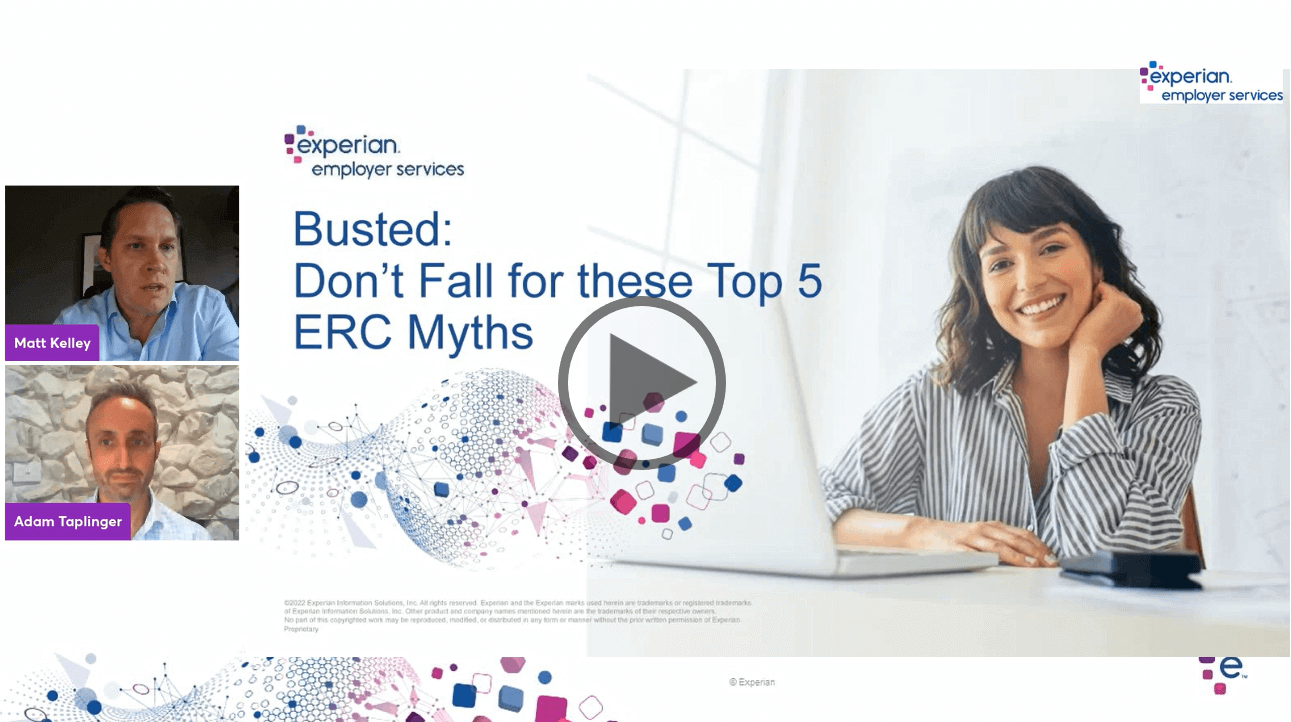“Does my business qualify for the ERC?” This is a common question, and most employers may assume the answer is “no.” The Employee Retention Credit stands out as one of the most significant COVID-19 relief measures for U.S. employers, but also one of the most complex. One of the biggest hurdles companies face when claiming the ERC is eligibility, but there are several myths that cause businesses to leave money on the table by ignoring this powerful tax credit.
Adam Taplinger and Matt Kelley hosted a webinar to bust 5 myths employers have when wondering if they qualify for the ERC. If you’re struggling to maximize this tax credit, join Adam and Matt by watching the full webinar and avoid common misconceptions.
The following is an excerpt from the webinar. Watch the full version here.
Matt Kelley: Let’s start with the first myth: “my organization must have a significant revenue decline in order to qualify for the ERC.”
So this myth comes from the definition of “eligible employer” or one of the definitions which is an employer can be considered eligible for the credit if they can demonstrate in 2020 a 50% decline in gross receipts. Comparing a 2020 quarter gross receipts to a 2019 quarter gross receipts, that threshold was changed to be a much more generous threshold in 2021, and it was decreased from 50% decline to a 20% decline, again using 2019 as a baseline. Because this test of determining whether you’re an eligible employer was introduced, most organizations feel like they have to be able to show revenue decline in order to be eligible, which in fact is not the case.
The law also provides that an employer can be eligible through a different path which is the “partial suspension path,” meaning if you can demonstrate that you have been partially suspended due to a government order at any point during the pandemic beginning in March 2020 through September of 2021, then you may be able to show that you’re an eligible employer based on a partial suspension without even looking at whether you had a decline in gross receipts. So it’s one of two paths, you don’t have to meet both of them and you don’t have to show a decline in gross receipts.
Adam what are you seeing from a market perspective on this myth?
Adam Taplinger: Thanks Matt, it’s funny I think I’ll use an analogy. I was in a doctor’s office not too long ago, and I saw a really funny coffee mug I thought was a little bit arrogant but it was really relevant to this topic. It said:
“My medical degree is more relevant than your Google search.”
I thought it was kind of hilarious. I was a little bit offended because I thought my Google search was much more interesting and relevant than his medical degree, just kidding, but I blame this myth on a lot of what we can find on the web and some of the others as well. But when you when you look at it, when you Google ERC, the first thing that pops up is this decline in revenue and to the extent that you meet this decline in revenue you can be eligible for this employee retention credit, full stop. So a lot of folks with great intentions don’t get past that point and I blame this one on a little bit of what we can find very easily from a Google search but with a little bit more digging most folks who see this myth will understand that there’s a little bit more to this than just that revenue decline.
Matt: Absolutely and I think that with this myth this is why a discussion with a tax professional is so important because you could box yourself out from a very helpful and very valuable credit if this is where you stop your search on Google.
Adam: Number two, this one I hear a lot from clients: “My business must have been closed completely by the government in order to be eligible for this credit.”
So for the folks that dove in a little bit further on that Google search, they ignored the coffee mug they went right in and they said, “okay there’s something else here, there’s another path to eligibility.” What we see and what we often hear is that “hey my business wasn’t closed down,” “I wasn’t closed by the government,” “I wasn’t closed by my state or the federal government,” or some other agency and frankly that’s just not necessary in order for company to claim this credit.



